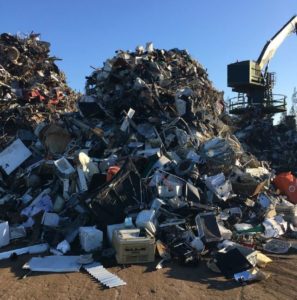 02/10/2020
02/10/2020The WEEE Forum has today published a paper outlining the issues associated with the treatment of WEEE as metal scrap and has called on the competent authorities to take appropriate action. The paper discusses how treating WEEE as metal scrap is problematic and encourages those responsible to penalize facilities that do so.
The practice of collecting or purchasing WEEE and handling it together with metal scrap is, unfortunately, a common practice in Europe and globally. This situation gives rise to environmental, health and safety issues because hazardous substances may likely not have been adequately removed or extracted. It also gives rise to compliance issues because WEEE collected and treated as metal scrap escapes the official routes that count towards reaching the collection targets set in WEEE legislation; attaining these targets has become very hard.
The attainment of the collection targets requires a redirection of WEEE tonnages into the officially reported flows. Competent authorities must prohibit the practice of purchasing and processing metal scrap that contains WEEE, unless they are treated and processed by facilities that are officially permitted or certified to do so. They must develop targeted, systematic enforcement actions to identify facilities that treat WEEE as scrap and penalize them. A lot of the issues result from failure of the operator permitting system; policies which mandate the scrap sector in the reporting of WEEE are called for.
Lucia Herreras, Deputy Director General of the WEEE Forum and one of the authors of the report said, ‘’Proper treatment should be ensured for WEEE collected with scrap by making sure that facilities that process scrap containing WEEE are approved by the relevant authority and achieve acceptable standards. In this way it can be ensured that the WEEE that they handle is processed correctly and, importantly, it is recorded separately so it can be included in the figures reported against collection targets.”
Due to low levels of enforcement activity, and PROs not having access to scrap facilities for data collection, reliable information on the WEEE tonnages affected by these practices is scarce. Finding an appropriate, harmonized methodology to collect data about how much WEEE disappears in the metal scrap stream is crucial to understand what is going on in the e-waste market.
Member States can use substantiated estimates, as referred to in Article 16 of the Directive, provided WEEE not properly treated stays out of the equation, otherwise it creates an unlevel playing field for the other Member States in achieving the collection targets in Europe.
The issues associated with WEEE in metal scrap will be discussed with representatives of the United Nations (which is the author of a recent WEEE Flows report), the European Commission and the stakeholders community at an online WEEE Forum event on 24 November 2020.
About
The WEEE Forum a.i.s.b.l. is an international association representing 51 producer responsibility organisations across the globe. Together with our members, we are at the forefront of turning the extended producer responsibility principle into an effective electronic waste management policy approach through our combined knowledge of the technical, business and operational aspects of collection, logistics, de-pollution, processing, preparing for reuse and reporting of e-waste. Our mission is to be the world’s foremost e-waste competence centre excelling in the implementation of the circularity principle.
Transparency Register ID 702397445-73.
Copyright 2019 All Rights Reserved
Contact
BluePoint conference and
business centre
Boulevard Auguste Reyerslaan 80
B-1030 Brussels
Belgium
Newsletter
Subscribe to our mailing list to get the updates to your email inbox.